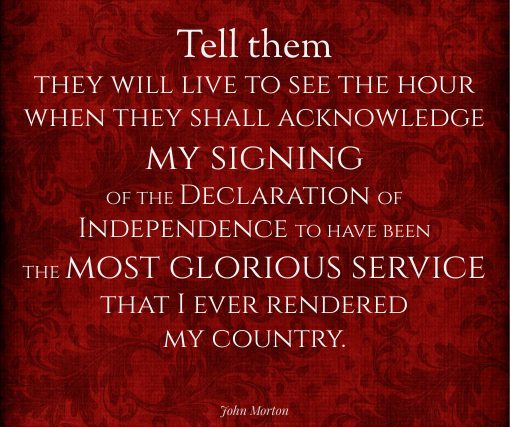Mark Cole
The signers of the Declaration of Independence were, above all else, men of extraordinary character. They demonstrated their character in many ways, but one of the most important was that when push came to shove, all of the signers were able to set aside their personal feelings and do what was necessary for the common good.
For some, this must have been especially difficult since not all of the signers were longtime supporters of the independence movement. John Morton was one of these men. In fact, right up until the votes were cast, he continued to actively oppose independence.
Morton was part of the Pennsylvania delegation to the Continental Congress and the delegates from Pennsylvania were evenly split on the question of independence. Half of them, led by Ben Franklin, supported independence, and half opposed it. But when all of the politicking and arm-twisting and deal-cutting were done and it came time to cast and count real votes, John Morton sided with the supporters of independence, thus tipping the Pennsylvania delegation into the independence camp – and, more importantly, thus assuring that the entire Second Continental Congress would unanimously support independence.
In a sense, then, John Morton cast a deciding vote – perhaps even the deciding vote – for independence. From that day forward the Colonies referred to themselves as Independent States.
Of course, the members of the Second Continental Congress went on to unanimously sign the Declaration of Independence. Even those men who had previously opposed independence such as John Morton pledged their lives, fortunes and sacred honor to the cause. They did so without hesitation. Morton’s signature is no less prominent than the most strident supporters of independence.
The message to King George III was crystal-clear: the Independent States are unified in their support of independence. There would be no turning back.
At the close of his life – which was only a few months away, and well before it was clear that America could fight off Great Britain – John Morton was abandoned by many of his friends who still opposed independence. Nonetheless, on his deathbed he said:
With that, John Morton of Pennsylvania died in April, 1777.
Check out Mark’s book:
Lives, Fortunes, Sacred Honor: The Men Who Signed the Declaration of Independence














